Ditapis dengan
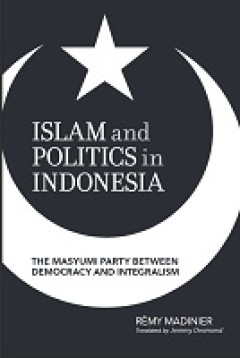
E-book Islam and Politics in Indonesia: The Masyumi Party between Democracy a…
The Masyumi Party, which was active in Indonesia from 1945 to 1960, constitutes the boldest attempt to date at reconciling Islam and democracy. Masyumi proposed a vision of society and government which was not bound by a literalist application of Islamic doctrine but rather inspired by the values of Islam. It set out moderate policies which were tolerant towards other religious communities in I…
- Edisi
- -
- ISBN/ISSN
- 9789814722568
- Deskripsi Fisik
- 506 halaman
- Judul Seri
- -
- No. Panggil
- 324.2598 MAD i
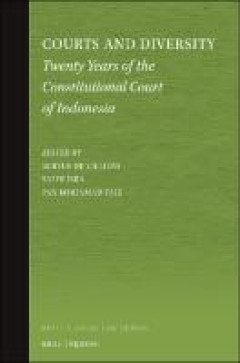
E-book Courts and Diversity: Twenty Years of the Constitutional Court of Indo…
The Constitutional Court of Indonesia functions in one of the most diverse societies in the world. It is required to resolve disputes within a kaleidoscope of diversity and plurality with flexibility, pragmatism, asymmetry, and wisdom. Whilst national minimum norms are important for nation-building, recognition of local customs, diversities and indigenous systems are equally important to protec…
- Edisi
- -
- ISBN/ISSN
- 9789004691698
- Deskripsi Fisik
- -
- Judul Seri
- -
- No. Panggil
- 341 VILL c
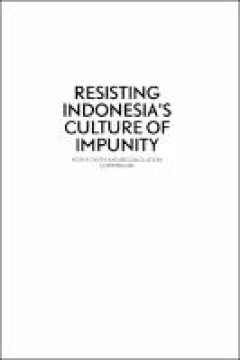
E-book Resisting Indonesia's Culture of Impunity: Aceh's Truth and Reconcilia…
Resisting Indonesia's Culture of Impunity examines the role of Indonesia’s first truth and reconciliation commission—the Aceh Truth and Reconciliation Commission, or KKR Aceh—in investigating and redressing the extensive human rights violations committed during three decades of brutal separatist conflict (1976–2005) in the province of Aceh. The KKR Aceh was founded in late 2016, as a pr…
- Edisi
- -
- ISBN/ISSN
- 9781760465841
- Deskripsi Fisik
- 282 halaman
- Judul Seri
- -
- No. Panggil
- 320.9598 MEL r
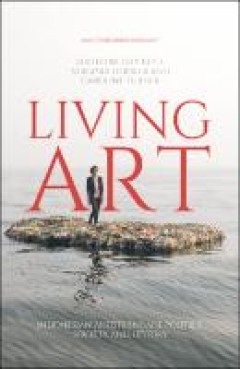
E-book Living Art: Indonesian Artists Engage Politics, Society and History
Living Art: Indonesian Artists Engage Politics, Society and History is inspired by the conviction of so many of Indonesia's Independence-era artists that there is continuing interaction between art and everyday life. In the 1970s, Sanento Yuliman, Indonesia’s foremost art historian of the late twentieth century, further developed that concept, stating: 'New Indonesian Art cannot wholly be und…
- Edisi
- -
- ISBN/ISSN
- 9781760464936
- Deskripsi Fisik
- 400 halaman
- Judul Seri
- -
- No. Panggil
- 320.9598 HOO l
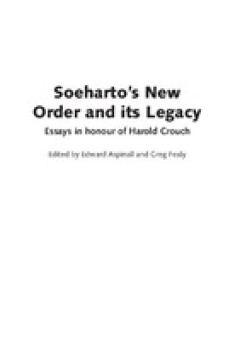
E-book Soeharto's New Order and its Legacy: Essays in honour of Harold Crouc
Indonesia’s President Soeharto led one of the most durable and effective authoritarian regimes of the second half of the twentieth century. Yet his rule ended in ignominy, and much of the turbulence and corruption of the subsequent years was blamed on his legacy. More than a decade after Soeharto’s resignation, Indonesia is a consolidating democracy and the time has come to reconsider the p…
- Edisi
- -
- ISBN/ISSN
- -
- Deskripsi Fisik
- 224 halaman
- Judul Seri
- -
- No. Panggil
- 320.9598 ASP s

E-book Authoritarian Modernization in Indonesia’s Early Independence Period…
In Authoritarian Modernization in Indonesia’s Early Independence Period, Farabi Fakih offers a historical analysis of the foundational years leading to Indonesia’s New Order state (1966–1998) during the early independence period. The study looks into the structural and ideological state formation during the so-called Liberal Democracy (1950–1957) and Sukarno’s Guided Democracy (1957�…
- Edisi
- -
- ISBN/ISSN
- 9789004437722
- Deskripsi Fisik
- 314 halaman
- Judul Seri
- -
- No. Panggil
- 959.8 FAK a
Angin Laut Tawar
Sebagai anak desa yang bergaul dengan alam secara akrab, walaupun saya telah lama meninggalkan kampung kelahiran saya dan berada jauh di ibukota, rasanya saya tetap masih berada di tengan alam Takengon. Kota besar seperti Jakarta, di masa saya hidup, seolah-olah tidak merangsang saya untuk menulis puisi, mungkin karena rasa rindu saya kepada alam di mana saya hidup di masa kecil jauh lebih mere…
- Edisi
- -
- ISBN/ISSN
- -
- Deskripsi Fisik
- 38 halaman
- Judul Seri
- -
- No. Panggil
- 813 ARA a
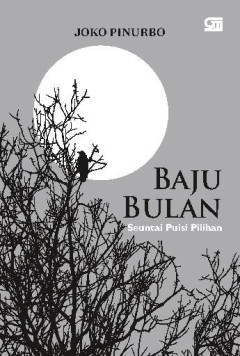
E-book Baju Bulan
"Rindu seperti sajak sederhana yang tak ada matinya. (2003) Setelah punya rumah, apa cita-citamu? Kecil saja: ingin sampai rumah saat senja supaya saya dan senja sempat minum teh bersama di depan jendela. (2004) Dengan kata lain, kamu tak akan pernah bisa membayar gurumu. (2004) Menggigil adalah menghafal rute menuju ibukota tubuhmu. (2005) Berilah kami rejeki pada hari ini dan ampu…
- Edisi
- -
- ISBN/ISSN
- -
- Deskripsi Fisik
- 96 halaman
- Judul Seri
- -
- No. Panggil
- 813 PIN b

Pride and Prejudice
Elizabeth Bennet dan Fitzwilliam Darcy sama sekali tidak cocok. Elizabeth menilai Mr. Darcy sebagai pria yang sok, angkuh, dan mengesalkan, sementara Mr. Darcy menganggap Elizabeth tidak anggun dan terlalu sering berprasangka. Mereka saling bermusuhan, bahkan sering kali saling melontarkan sindiran pedas.Tapi kebencian mereka berangsur menjadi ketertarikan. Seiring berja- lannya waktu, Eliza…
- Edisi
- Cet. 1
- ISBN/ISSN
- 9786027870840
- Deskripsi Fisik
- 588 hlm, 13 x 20,5 cm
- Judul Seri
- -
- No. Panggil
- 823 AUS p
Kisah Hidup Queeny Chang: Putri Orang Terkaya di Indonesia Asal Medan
Queeny Chang atau Tjong Foek Yin lahir pada tahun 1896 adalah putri dari Tjong A Fie, orang terkaya di Indonesia asal Medan. Dalam buku ini, Queeny berkisah tentang perjuangan hidupnya sebagai putri orang kaya serta perjalanan hidup sang ayah dari pemuda miskin kemusian menjadi kaya raya setelah merantau dari daratan China ke tanah Sumatra dengan hanya bermodalkan uang 10 sen. Walau hidup…
- Edisi
- -
- ISBN/ISSN
- 9789790561144
- Deskripsi Fisik
- 258 hlm.; ilus. : 20 cm.
- Judul Seri
- -
- No. Panggil
- 920 DAV k
 Karya Umum
Karya Umum  Filsafat
Filsafat  Agama
Agama  Ilmu-ilmu Sosial
Ilmu-ilmu Sosial  Bahasa
Bahasa  Ilmu-ilmu Murni
Ilmu-ilmu Murni  Ilmu-ilmu Terapan
Ilmu-ilmu Terapan  Kesenian, Hiburan, dan Olahraga
Kesenian, Hiburan, dan Olahraga  Kesusastraan
Kesusastraan  Geografi dan Sejarah
Geografi dan Sejarah